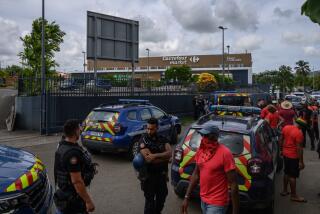France Wins U.N. OK for Rwanda Plan : Africa: Force will try to end massacres. First troops to launch mission today.
- Share via
UNITED NATIONS — A divided Security Council, wary of making things worse yet desperate to end the horror, authorized France on Wednesday to lead a military force into Rwanda to stop the massacres that have left several hundred thousand civilians dead in the midst of a tribal war.
In Paris, Defense Minister Francois Leotard said the first few hundred French troops will launch “Operation Turquoise” this morning. He said France will contribute 2,000 to 2,500 troops. Senegal has pledged to augment this with an undisclosed number of its troops.
Wednesday’s Security Council vote reflected the world body’s unease about a Rwandan mission. France managed to muster only one more than the nine votes required for the resolution. Five nations--China, Nigeria, New Zealand, Brazil and Pakistan--abstained.
Their stated objections were twofold: that the intervention should be led by the United Nations, not France, and that one of the warring groups--the rebel Rwandan Patriotic Front--says it regards the resolution as a declaration of war.
Madeleine Albright, the American ambassador to the United Nations, voted for the resolution and hailed France for its “bold . . . initiative” and “noble offer to lead the world community in dealing with the tragedy in Rwanda.”
“The tales of butchery . . . become almost mind-numbing,” she said. “But we cannot afford to become numb to this tragedy, for it is still unfolding before our eyes.”
Despite her praise, the French intervention, if successful, could prove embarrassing to the Clinton Administration. Using Rwanda as the test case of the Administration’s stringent new policy on peacekeeping, Albright forced the Security Council in mid-May to put conditions on its authorization of a U.N. peacekeeping mission of 5,500 troops. U.N. officials believe that the obvious lack of American enthusiasm for a U.N. intervention crippled Secretary General Boutros Boutros-Ghali’s attempts to recruit troops for the mission then.
His failure prompted France to offer to send its troops for two months while the United Nations organizes its own mission. The French intervention is unhampered by the conditions--such as approval from warring parties and signing of a cease-fire--imposed on the United Nations by the United States. A successful Operation Turquoise would be regarded as persuasive evidence that the Administration’s conditions were unnecessary.
The massacres erupted in Rwanda when the presidents of Rwanda and neighboring Burundi, both members of the Hutu tribe, died in a suspicious plane crash in April. The Hutu-dominated army and gangs of Hutu extremists then began a slaughter of the minority Tutsi tribe and of Hutu politicians willing to share power with the Tutsis.
The Tutsi-dominated Rwandan Patriotic Front then swooped down from the north to battle the Hutu army, taking over perhaps half of the tiny, hilly country in Central Africa. Weeks of civil war have produced massacres of Hutus by the rebels as well.
The rebels oppose the intervention because France has been a major supporter and arms supplier of the Hutu-dominated government.
But French Ambassador Jean-Bernard Merimee told the council: “The French initiative has an exclusively humanitarian goal. . . . Our objective is simple: Help the threatened civilians, end the massacres and do it all in an impartial way.”
The 10 countries voting in favor of the resolution were France, the United States, Rwanda, Britain, Russia, Oman, Spain, the Czech Republic, Djibouti and Argentina.
More to Read
Sign up for Essential California
The most important California stories and recommendations in your inbox every morning.
You may occasionally receive promotional content from the Los Angeles Times.













